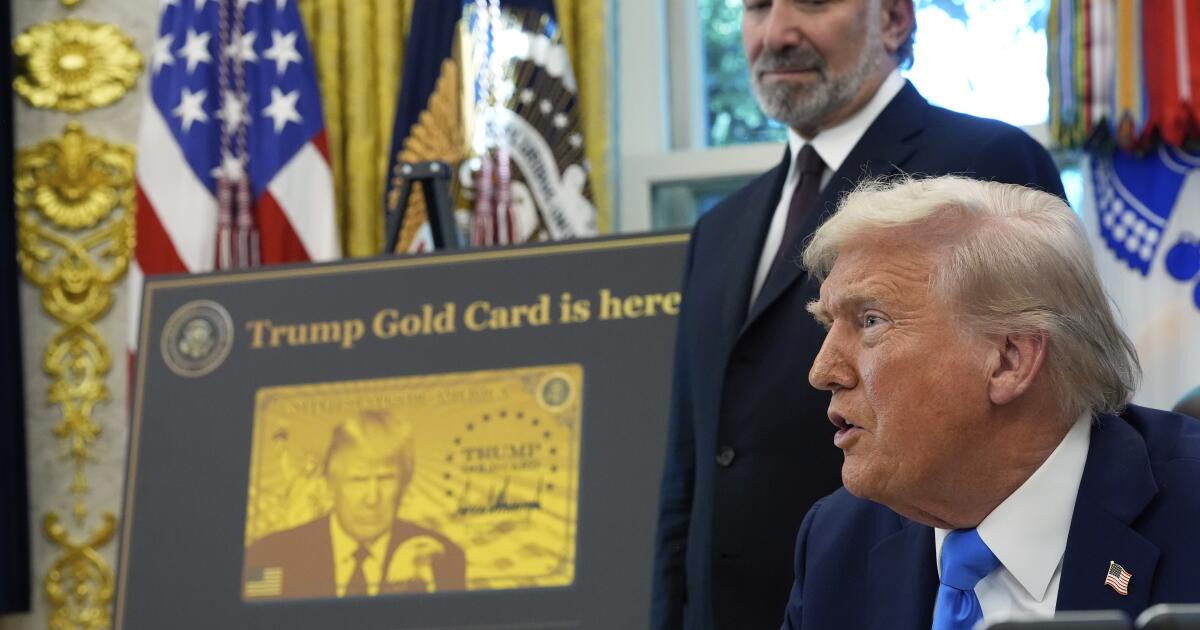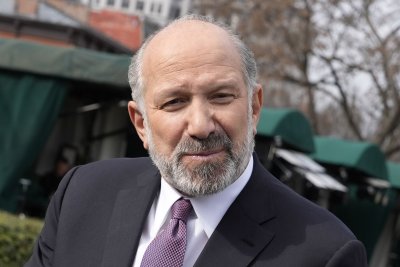India expresses concern about Trump’s move to hike fees for H-1B visas
WASHINGTON — The Indian government expressed concern Saturday about President Trump’s latest push to overhaul American immigration policy, dramatically raising the fee for visas that bring tech workers from India and other countries to the United States.
The president on Friday signed a proclamation that will require a $100,000 annual fee for H-1B visas — meant for high-skilled jobs that tech companies find hard to fill. He also rolled out a $1-million “gold card” visa for wealthy individuals, moves that face near-certain legal challenges amid widespread criticism that he is sidestepping Congress.
If the moves survive legal muster, they will deliver staggering price increases. The visa fee for skilled workers is currently $215.
India’s Ministry of External Affairs said Saturday that Trump’s plan “was being studied by all concerned, including by Indian industry.” The ministry warned that “this measure is likely to have humanitarian consequences by way of the disruption caused for families. Government hopes that these disruptions can be addressed suitably by the U.S. authorities.”
More than 70% of H-1B visa holders are from India.
H-1B visas, which require at least a bachelor’s degree, are meant for high-skilled jobs that tech companies find difficult to fill. Critics say the program undercuts American workers, luring people from overseas who are often willing to work for as little as $60,000 annually. That is well below the $100,000-plus salaries typically paid to U.S. technology workers.
Trump said Friday that the tech industry would not oppose the move. Commerce Secretary Howard Lutnick claimed that “all big companies” are on board.
Representatives for the biggest tech companies, including Amazon, Apple, Google and Meta, did not immediately respond to messages for comment. Microsoft declined to comment.
“We’re concerned about the impact on employees, their families and American employers,” the U.S. Chamber of Commerce said in a statement. “We’re working with the Administration and our members to understand the full implications and the best path forward.”
Lutnick said the change would probably result in far fewer H-1B visas than the 85,000 annual cap allows because “it’s just not economic anymore.”
“If you’re going to train people, you’re going to train Americans,” Lutnick said on a conference call with reporters. “If you have a very sophisticated engineer and you want to bring them in … then you can pay $100,000 a year for your H-1B visa.”
Trump also announced that he will start selling a “gold card” visa with a path to U.S. citizenship for $1 million after vetting. For companies, it would cost $2 million to sponsor an employee.
Trump also announced a “platinum card,” which could be obtained for $5 million and would allow foreigners to spend up to 270 days in the U.S. without being subject to U.S. taxes on non-U.S. income. Trump announced a $5-million gold card in February to replace an existing investor visa — this is now the platinum card.
Lutnick said the gold and platinum cards would replace employment-based visas that offer paths to citizenship, including for professors, scientists, artists and athletes.
Critics of H-1Bs visas who say they are used to replace U.S. citizens in certain jobs applauded the move. U.S. Tech Workers, an advocacy group, called it “the next best thing” to abolishing the visas.
Doug Rand, a senior official at U.S. Citizenship and Immigration Services during the Biden administration, said the proposed fee increase was “ludicrously lawless.”
“This isn’t real policy — it’s fan service for immigration restrictionists,” Rand said. “Trump gets his headlines, and inflicts a jolt of panic, and doesn’t care whether this survives first contact with the courts.”
“The president has no legal authority to tax American visas,” said Michael Clemens, a George Mason University economist who studies immigration. “He has the authority to charge reasonable fees for cost recovery, not set fees at $100,000 or $100 million or whatever suits his personal … arbitrary capricious whims.
“If the president feels that H-1B visas are harmful, he can work with the people’s representatives in Congress to reform the laws that regulate those visas. His choice to legislate by proclamation subverts our entire immigration governance system,’’ said Clemens, who is also a senior fellow at the Peterson Institute for International Economics. “Beyond that, it is poisonous [and] irresponsible to do so with no warning, no public debate, leaving hundreds of thousands of workers and millions of their colleagues and family members in chaos and fear.’’
Lutnick said the H-1B fees and gold card could be introduced by the president but the platinum card needs congressional approval.
Historically, H-1B visas have been doled out through lottery. This year, Amazon was by far the top recipient of H-1B visas, with more than 10,000 awarded, followed by the Indian firm Tata Consultancy, then Microsoft, Apple and Google. Geographically, California has the highest number of H-1B workers.
Critics say H-1B spots often go to entry-level jobs, rather than senior positions with unique skill requirements. And while the program isn’t supposed to undercut U.S. wages or displace U.S. workers, critics say companies can pay less by classifying jobs at the lowest skill levels, even if the specific workers hired have more experience.
As a result, many U.S. companies find it cheaper to contract out help desks, programming and other basic tasks to consulting companies such as Wipro, Infosys, HCL Technologies and Tata — all in India — and IBM and Cognizant in the U.S. These consulting companies hire foreign workers, often from India, and contract them out to U.S. employers looking to save money.
Ron Hira, a professor in the political science department at Howard University and a longtime critic of H-1B visas, said the plan was a move in the right direction.
“It’s a recognition that the program is abused,’’ he said.
Raising the visa fee, he said, was an unusual way to address the H-1B program’s shortcomings. Normally, he said, reformers seek ways to raise the pay of the foreign workers, eliminating the incentive to use them to replace higher-paid Americans. He noted approvingly that Trump’s proclamation calls for the U.S. Labor Department to “initiate a rule-making [process] to revise the prevailing wage levels’’ under the visa program.
Critics of H-1B visas have also called on the lottery to be replaced by an auction in which companies vie for the right to bring in foreign workers.
First Lady Melania Trump, the Slovenian-born former Melania Knauss, was granted an H-1B work visa in October 1996 to work as a model.
In 2024, lottery bids for the visas plunged nearly 40%, which authorities said was due to success against people who were “gaming the system” by submitting multiple, sometimes dubious, applications to unfairly increase chances of being selected.
Major technology companies that use H-1B visas sought changes after massive increases in bids left their employees and prospective hires with slimmer chances of winning the random lottery. Facing what it acknowledged was likely fraud and abuse, U.S. Citizenship and Immigration Services this year said each employee had only one shot at the lottery, whether the person had one job offer or 50.
Critics welcomed the change but said more needs to be done. The AFL-CIO wrote last year that while changes to the lottery “included some steps in the right direction,” it fell short of needed reforms. The labor group wants visas awarded to companies that pay the highest wages instead of by random lottery, a change that Trump sought during his first term in the White House.
Associated Press writers Ortutay and Kim reported from Oakland and Washington, respectively. AP writers Adriana Gomez Licon in Fort Lauderdale, Fla., Elliot Spagat in San Diego and Paul Wiseman in Washington contributed to this report.

